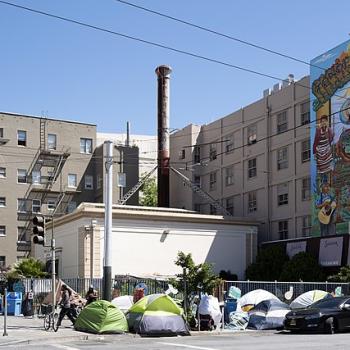
Bernie Sanders and Hillary Clinton at the first 2016 Democratic presidential debate in Las Vegas, 10-13-15 [You Tube video still shot / reuse permitted based on Creative Commons license]
***
(originally posted on 4-4-04)
***
The following is derived from letters and dialogues I had with Catholic Democrats.
***
How can a “faithful Catholic” (or a faithful orthodox Protestant who accepts the historic Protestant doctrines and moral teachings) vote for a politician who sanctions the practice of sticking scissors in the neck of a full-term baby and sucking its brains out (let alone abortion in general)? That’s not even including things like homosexual “marriage,” radical feminism, fetal experimentation, assisted suicide, and suchlike.
They can try to separate their vote from the responsibility of the promulgation of abortion, but I just don’t buy it. Our choices have consequences. Legal abortion arrived in the first place in large part because the Catholic Church was weak. The dissidents were already attacking the ban on contraception, heroically reaffirmed by Pope Paul VI in Humanae Vitae in 1968. Contraception was legally crucial as the groundwork for Roe (the Griswold case). It paved the way, very directly. So the time was ripe.
Catholics vote for pro-abortion politicians and this allows abortion to continue. This is contrary to Church teaching. Such voters participate in a causal sense in promoting abortion if they vote in men and women who believe that it should be legal. It is an outrage. It seems to me the only way they can possibly defend this is to separate their vote for a Democrat from the causal factor of how this might perpetuate the status quo of Roe v. Wade. And I think that will be an uphill battle (to put it mildly).
One must flat-out deny what the Catholic Church teaches in order to make the assertion that one can be a “good Catholic” and also a card-carrying Democrat today, given the morally-troublesome Democratic platform and advocacy of various immoral issues. This is why I maintain that it is impossible to synthesize the two at present (it wasn’t always so – before legal abortion).
I agree that the Democrats have traditionally had a more fruitful social conscience. They were in the forefront of the fight for racial equality and justice (though more Republicans than Democrats voted for the Civil Rights Act in 1964; Al Gore’s father, e.g., voted against it, along with many Southern segregationalist Democrats). They brought us social security, Medicare, and praiseworthy programs for first-time home buyers, etc. which are social goods. But that was then; now they are a force for child-killing, homosexual rights (i.e., preferential treatment), radical feminism, assisted suicide, etc.
This is the sad state of affairs that we live in today. Now we have serious debates about whether the brutal, savage slaughter of a full-term baby about to be born should moral and legally permissible. It’s almost beyond belief. I can’t even comprehend this level of moral lunacy and outrageous injustice anymore. Yet we went into a lengthy national mourning after 9-11, which (horrible as it was) caused less deaths than a day’s work in an abortion clinic. And at least those people had some sort of life before they were killed, and some chance to escape (however slight, in many cases). The baby about to be ripped to shreds has neither.
In presidential elections, it has been clear for years now that the Democrat has to favor legal abortion to run at all. So no Catholic or pro-life non-Catholic Christian can vote for such a person. It can’t be justified, just as we now condemn anyone who voted for Hitler (who only killed 6 million, compared to the 50 million legal abortions in the US in 30 years). I think this is morally and ethically obvious.
I think it all comes down to the willingness (conscious or otherwise) to separate public and private morality; personal and civic virtue. That’s what brought us abortion, the sexual revolution, and also the schizophrenic nonsense of being so-called “pro-choice” (i.e., “personally opposed” to abortion, but willing to allow it to continue legally).
This derives historically, I would argue, from elements of the Renaissance, the so-called Enlightenment, English Deism and rationalism, and onto more modern forms of secularist philosophy and thought (liberalism, Marxism, libertarianism, legal positivism, humanism, pragmatism, et al). They all separated things such as faith and reason, private and public morality, Christ and culture, church and state, etc. And these strains of thought have deeply penetrated into the American psyche, if not all of the western world.
That bizarre inconsistency is the foundation for millions of professed Christians (Catholic, Orthodox, and Protestant alike) voting for people whose principles are diametrically opposed to Christianity; in fact they are often outright espousals of rank paganism and blatantly utilitarian, even at times nihilistic, ethics. Ignorance of one’s own supposed religious beliefs doesn’t help, either, of course.
I have lambasted Republicans also on my website. But I continue to say that a Catholic in good standing cannot possibly defend a vote for a pro-abort. I have voted for pro-life Democrats in local races, and will not vote for any pro-abort Republican. Abortion is the morally-defining issue of this generation. It is immediately morally schizophrenic to vote for a guy like Kerry, whereas one can vote for Bush without violating any Catholic precept.
It is largely a failure of consistent thinking, and of molding one’s outlook in harmony with the “mind of the Church.” One’s view of culture and politics (indeed, all of life) must be synthesized with their religious worldview. That’s what it means to be a disciple of Christ: everything (that includes politics and government) comes under His Lordship. But if someone is informed of, say, partial-birth abortion and continues to vote for the guy who upholds it, what do we conclude then? Is there not some sin in that?
A position which is the moral equivalent of Nazism is neither respectable, nor arguable in “polite circles.” Many pro-lifers act as though a person can be both “respectable” and “honorable” and a pro-abort.
We don’t regard the Nazis in that fashion; we loathe them because they were for wanton massacre. Yet many conservatives (e.g., Rush Limbaugh) express such admiration for, say, Colin Powell, as a “great man,” even though he is a pro-abort. More schizophrenia. We must qualify his “greatness”; we can say he was a great general. But a “great man”? Not if we are pro-lifers . . . .
I am not seeking to judge any person’s heart or soul. I am addressing hypocrisy and moral schizophrenia, just as Jesus did, particularly with the Pharisees. I haven’t yet found a Catholic Democrat who put up any sort of reasoned defense for why they vote the way they do (particularly regarding abortion). I either get nothing, theological liberalism, or a pack of propaganda-induced lies about both the nature and motivation of Republicans and Conservatives. It gets very frustrating.
When people vote for politicians who favor abortion, they are a party to that outrageous crime. They don’t get off by taking the libertarian route and simply saying that they personally oppose abortion. 4000 babies die every day. Al Gore and Richard Gephardt were pro-life at one time; so was Bill Clinton and Jesse Jackson. They all caved because any Democrat running for President, or hoping to, has to be in favor of child-killing. This is the party that Christians want to support (God help us)? It can’t be justified from a Catholic or a conservative Protestant standpoint. Christianity is about love and compassion and putting the little guy first: not about butchering defenseless babies. A Catholic cannot vote for a politician who supports abortion. He just can’t do it. he have to choose between his Church and his political party, I’m afraid, on this issue.
And that is, of course, exactly what many Catholics do: they are much more “American” and “Democrat” and “liberal” than they are Catholic. And so they will ditch those teachings of the Church that they don’t care for, such as the ban on contraception, the immorality of fornication, and of abortion. It always seems to be the sexual issues, for some strange reason.
Jesus tells us to protect the innocent. And that is why a Catholic or any sort of Christian who believes in the inspiration of the Bible cannot vote for people who sanction the slaughter of children. I’ve always opposed racism and prejudice and the oppression and exploitation of the poor, as a political conservative (generally-speaking); so-called “liberals” and mainstream Democrats should oppose child-killing as political liberals, since liberalism historically was in favor of the little guy and the oppressed and exploited. This is the inconsistency in the Democratic Catholic position (insofar as the person votes for a pro-abortion candidate).
The Democrats are no longer the party of JFK or FDR, because advocating abortion is not helping the “little guy” and the oppressed. It’s one thing to advocate social reform along more traditionally liberal or left-leaning lines (New Deal, Great Society, unions, civil rights, equality for women and minorities, health care provisions, social security and Medicare, etc. — much of which is very good and consistent with Catholic social teaching); quite another to adopt wholesale radical moral teachings that contradict Christianity, as formerly understood by both liberals and conservatives.
Malcolm X was a greater revolutionary than Dr. Martin Luther King, because he stressed personal behavior and ethics as well as social reform, which the latter almost solely concentrated on. I think Rev. King (much as I immensely admire the man) should have publicly taught much more biblical personal morality, but that was a function, I think, of the separation of “social gospel” from personal righteousness, which unfortunately occurred in Christianity (both Catholic and Protestant).
The theological liberals (who tended to be politically liberal) emphasized the social and institutional, while conservatives (who tended to be politically conservative as well) emphasized individual traditional Christian morals and the family. The Catholic Church brings both impulses together and refuses to separate them. That’s why I consider it a “third way” — distinct from both political parties, which have become polarized in such an unnecessary manner, and mostly secularized, too.













